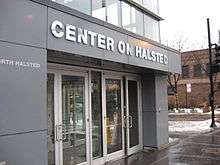LGBT culture in Chicago
Chicago has long had a gay neighborhood. Beginning in the 1920s there was active homosexual nightlife in Towertown, adjacent to the Water Tower. Increasing rents forced gay-friendly establishments steadily northwards, moving through Old Town and Lincoln Park along Clark Street and on to Boys Town. Boys Town presently serves as the best-known Chicago gayborhood, and the center of its LGBT culture.[1] Gentrification has pushed many gay and lesbian people to reside ever further north into Uptown and Edgewater.
Politics
In 1961 Illinois was the first state to repeal its sodomy law. Effective LGBT political involvement began in the 1960s alongside the civil rights movement, with organizations such as Chicago Gay Liberation.
The Chicago Gay and Lesbian Democrats was the main LGBT political group of the 1980s. LGBT interest groups and the Democratic Party have facilitated LGBT political involvement in Chicago.[2]
Throughout the 1960s, 1970s, and 1980s Chuck Renslow[3] was one of the main pioneers for Chicago's LGBT community through his advocacy for inclusion, and fought alongside the Democratic party to push for non-discrimination amongst LGBT individuals in Chicago. Chuck was also widely known for his long-running leather bar, which was also one of the first opened in Chicago, and his world-renowned provocative male photography that earned him a spot in the Chicago LGBT Hall Of Fame.[4]
In 1983 Mayor of Chicago candidate Jane Byrne promised to support LGBT issues, so the Chicago Gay and Lesbian Democrats endorsed Byrne. However Harold Washington won the Democratic Party primary. At that point the LGBT voters began to support Washington, and they helped him win the general election. LGBT voters supported Washington during his reelection in 1987 because, during his previous term, he supported LGBT causes and criticized homophobia.[2] The following year, in 1988, he signed into law an anti-discrimination ordinance for the city of Chicago.
ACT UP/Chicago was an organization dedicated to improving the lives of people with AIDS. It often criticized Mayor of Chicago Richard M. Daley. It later became a part of the Chicago LGBT Hall of Fame.[5]
Institutions
- Center on Halsted, LGBT community center
- Howard Brown Health Center, LGBT health care center
- Windy City Black Pride, LGBT-related assistance and events serving African-American communities[6]
- Chicago Gay and Lesbian Hall of Fame, honors LGBT individuals
- National Gay and Lesbian Sports Hall of Fame
- Leather Archives and Museum, collects and exhibits artifacts related to LGBT leather subculture
- Gerber/Hart Library, largest circulating library of gay and lesbian titles in the Midwestern United States
See also
- Legacy Walk, an outdoor public display in Chicago, Illinois, USA which celebrates LGBT contributions
- Boystown, section of Lakeview was the first officially recognized gay village in the United States
Media
Newspapers Chicago Gay Crusader (now defunct) and Windy City Times have served LGBT readers. Windy City Radio is the city's only LGBT radio station.[6] Online guide ChicagoPride.com is a news and events website for the Chicago/Midwest LGBT community.
Recreation
- The Chicago Pride Parade, the annual gay pride parade in June; over a million people now participate in the pride festivities[7]
- Reeling: The Chicago LGBTQ International Film Festival, founded in 1981
- Chicago Gay Men's Chorus, founded in 1983
- Bijou Theater
References
- Blackwell, Elizabeth Canning (2012). Frommer's Chicago. Frommer's Color Complete (17th ed.). Hoboken, NJ: John Wiley & Sons. p. 351. ISBN 9781118162415 – via Internet Archive.
- Haider-Markel, Donald P. (2002). Gay and Lesbian Americans and Political Participation: A Reference Handbook. Political Participation in America. Santa Barbara, CA: ABC-CLIO. p. 145. ISBN 9781576072561 – via Google Books.
- "Chuck Renslow", Wikipedia, 2020-01-02, retrieved 2020-02-27
- "CHARLES "CHUCK" RENSLOW – Chicago LGBT Hall of Fame". Retrieved 2020-02-27.
- Gould, Deborah B. (2009). Moving Politics: Emotion and ACT UP's Fight Against AIDS. Chicago: University of Chicago Press. p. 43. ISBN 9780226305318 – via Google Books.
- Savage, Dan & Miller, Terry, eds. (2011). It Gets Better: Coming Out, Overcoming Bullying, and Creating a Life Worth Living. New York: Penguin Books. n.p. ISBN 9781101513408 – via Google Books.
- Rodriguez, Meredith. "Enhanced police presence helped temper Pride Parade crowd, officials say". chicagotribune.com.
Further reading
- Austin, Jill & Brier, Jennifer (2011). Out in Chicago: LGBT History at the Crossroads. Chicago: Chicago History Museum – via Google Books.
- Baim, Tracy, ed. (2008). Out and Proud in Chicago. Chicago: Agate Publishing. ISBN 9781572846432.
- de la Croix, Sukie (2012). Chicago Whispers: A History of LGBT Chicago before Stonewall. UPCC Book Collections on Project MUSE. Madison: University of Wisconsin Press. ISBN 9780299286934..
External links
- Daily (and first) online LGBT Guide to Chicago - ChicagoPride.com
- LGBT Guide to Chicago
- "LGBT Community Action Plan" - City of Chicago
- Reeling LGBT Film Festival
- "The 5 Best LGBT Bars" (Archive). Chicago. February 2013.
